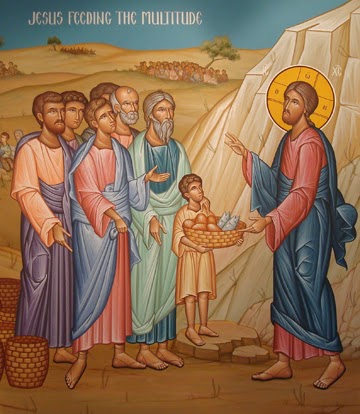Luke 9: 1-17
He called the twelve together and gave to them
potent authority and formative power, so that they could work against all
demonic mischief, and heal all sickness.
And he sent them out to heal and to proclaim the Kingdom of God,
appearing now on earth, the kingdom of human beings filled with God’s spirit.
And he said to them, “Take nothing with you on the
way: no staff for support, no bag for collecting, neither bread nor money, no
change of clothes. If you enter a house, remain there until you go further. And
where they do not accept you, leave their city and shake the dust from your
feet as a sign that they have refused community with you.”
They left and walked through the villages of the
country, announcing the joyful message of the new working of the kingdom of the
angels and healing everywhere.
Meanwhile Herod the Tetrarch heard of all that was
happening and he was very perplexed, for some said, “John is risen from the
dead,” and others said that Elijah had appeared, and yet others, “One of the
Prophets of old has risen again.” And Herod said, “John I have had beheaded;
who now is this, about whom I hear all these things?” And he wished to see him
himself.
And the apostles returned and reported to Jesus
everything that they had accomplished. So he gathered them to himself and
retreated with them to a city called Bethsaida for special
instruction. But the people became aware of it and followed him. He welcomed
them and spoke to them of the Kingdom of God of the future, of the human
kingdom on earth filled with the divine spirit, and he healed all who had need
of it.
But the day began to decline. The twelve came up to
him and said, “Send the crowd away so that they can reach the villages and
farms in the vicinity and find food and lodging, for here we are in a deserted
place.” He however said to them, “From now on it falls to you; you give them to
eat.”
They answered, “We have nothing but five loaves and
two fish. Or shall we go and buy food for all of them?“ There were about five
thousand people.
Then he said to the disciples, “Have them sit down
in groups of fifty”. And they did so, and all reclined.
Then he took the five loaves and the two fish and,
raising his soul to the spirit, gave thanks, broke them, and gave them to his
disciples to distribute to the people. And they ate, and all were satisfied.
And they took up the pieces that remained: twelve baskets full.
 |
| Margarete Woloschina |
4th August Trinity
August 14, 2011
Luke 9:1-17
When we go to sleep at night, our souls and spirits travel
to the stars. We rise in sleep to the world of the stars. We commune with the
angels. They feed us ‘star bread’ and ‘star wine’, nourishment for our spirits,
so that we return to earth strengthened and refreshed.
Even on earth during the day, when we are very hungry, we
can feel how, with a good meal, body and soul come together again, realigning
themselves. This happens, not because of the food’s material content, but
because of the life force it offers.
In today’s reading, the crowds stay with Christ, to hear the
good news, the message from the realm of the angels. And as the day approaches
night, the first stars appear, and Christ feeds them from the realm of the
stars. For Christ’s thanks and blessing brings down the life force that streams
in from the stars. With the food, the people take in ‘star bread’, offered to
them by the angels, distributed by the disciples on earth.
In the Act of Consecration of Man, with Christ’s help, we
too raise ordinary bread to receive the life of the universe. Though but little
in material terms, we are fed in abundance. Our hearts, our souls, our spirits
drink deep at the wellspring of life, and our spirits are satisfied.











